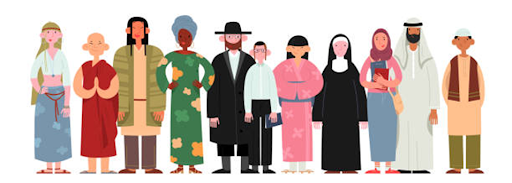Author: Larry Dansky
Praise God the construction worker, who builds up the city.
Praise God the social worker, who heals the brokenhearted.
Praise God the nurse, who binds up our wounds.
Praise God the migrant farm worker who gives us our food,
Praise God the grocery worker, who fills our table with goodness.
Praise the Holy One, the essential worker, who is gracious!
Praise your God, O people! Give thanks and praise! – Steve Garnaas-Holmes
I went to the mosque, went to the church, and nowhere did I find a trace of divinity. Then I came and stood in front of you, and all that is divine manifested in front of me. – Abhijit Naskar
A story is told about a monastery that had once been part of a great order, but had fallen on hard times. There were only five monks left, the Abbott and four others, all of whom were over the age of 70. In the woods surrounding the monastery was a little hut that a local Rabbi used for a hermitage. One day, it occurred to the Abbot to visit the hermitage to see if the Rabbi could offer any advice that might save the monastery. At the end of the visit, the Abbott said “It has been wonderful being with you, but I have failed in my purpose for coming. Have you no piece of advice that might save the monastery?” “No, I am sorry,” the Rabbi responded, “I have no advice to give. The only thing I can tell you is that the Messiah is one of you.” When the monks in the monastery heard of the Rabbi’s words, they began to treat each other with extraordinary love and respect, on the off chance that one of them might be the Messiah. When people from the village sensed the aura of extraordinary respect and love that surrounded the five old monks, they began to come more frequently. They brought their friends, and their friends brought friends. Some of the younger men who came to visit began to engage in conversation with the monks. After a while, one asked if he might join. Then another, and another. Within a few years, the monastery became once again a thriving order, and a vibrant, authentic community of light and love.
When I think about the divinity of others, it is mostly those who are famous for their gifts of compassion and giving (think Mother Teresa and The Dali Lama). Intellectually I believe that there is the divine in all of us, but I struggle to awaken to the divinity in all the people I encounter. I do not consciously think about the divinity of the person I pass on the street or the construction worker who remodels my bathroom. Then I read the above poem by Steve Garnaas-Holmes. He doesn’t say praise God for the construction worker (social worker, nurse, farm laborer, grocery worker), but identifies them as God (God the nurse, God the farm laborer, God the grocery worker, etc.), and gives thanks and praise to them.
Thinking about all of this has encouraged me to begin a new spiritual practice. I am going to try to consciously approach each person I encounter as a sacred manifestation of the divine. That means that I will need to intentionally refrain from making any first impressions. I will not simply acknowledge them, but I will look at and listen to them deeply. When I am awake to the divinity of others, I am more open, accepting, and respectful of others. I do not judge them so quickly, regardless of whether they are dressed in a suit driving a Cadillac or covered in tattoos and on a skateboard. I am hoping that this practice can help me (like the monks in the monastery) bring some light and love to my community.
Holy one, as we prepare to celebrate the birth of Jesus of Nazareth, help us to remember that we are all manifestations of the divine. My prayer is that, if we can awaken to the divine spark within us and within those we encounter, we may build a strong, vibrant and loving community.

